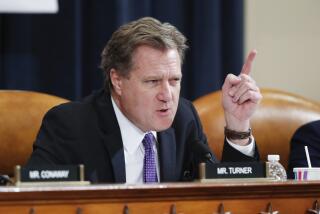Troubling disclosures are likely to change how the NSA does its spying
WASHINGTON â After decades of pushing the boundaries of electronic espionage, the National Security Agency finds itself exposed as never before, and the anything-goes ethos of secret surveillance may never be the same.
New limits on Americaâs global surveillance operations are almost certain thanks to leaks from former NSA contractor Edward Snowden showing that the spy agency eavesdropped on dozens of foreign leaders, including German Chancellor Angela Merkel and other close allies.
âThis is going to change the way the NSA does business for decades to come,â said Stewart Baker, a former NSA general counsel who writes frequently about intelligence matters.
Americaâs allies are embarrassed and angry, demanding curbs on U.S. spying in their countries. At home, Silicon Valley technology giants are in open revolt and are lobbying to outlaw key surveillance programs after learning that the NSA has broken into their communications links abroad to vacuum up their customersâ private data.
Obama administration officials and leading lawmakers, who staunchly defended the NSA after Snowden began leaking classified documents that were disclosed June, have begun to distance themselves from the agency.
âIn some cases, some of these actions have reached too far, and we are going to try to make sure it doesnât happen in the future,â Secretary of State John F. Kerry said Friday in London.
In an interview with the new Fusion television network last week, President Obama said he would âmake sure that âwhat theyâre able to doâ doesnât necessarily mean âwhat they should be doing.ââ Aides said he already had ordered a halt to some NSA operations, but they declined to describe them.
Current and former U.S. intelligence officials see a turning point.
Members of the administration âreally donât know how to handle this second wave of European outrage, and everybody knows that there are worse disclosures to come,â said Mark Lowenthal, a former senior CIA analyst.
âSome people are still trying to defend what [the NSA is] doing here, but it feels like weâve crossed a threshold,â said Mieke Eoyang, a former House intelligence aide who directs the national security program at Third Way, a centrist Washington think tank.
Intelligence officials appear both baffled and annoyed that long-standing systems and practices are suddenly being criticized.
Army Gen. Keith Alexander, the NSA director, sarcastically told an audience Thursday that among the U.S. officials who had requested surveillance of allied leaders is, âLet me think. Hold on. Oh. Ambassadors.â
James R. Clapper, the director of national intelligence, told lawmakers that spying on foreign leaders, friends and foes alike, is at the core of collecting intelligence â and that the U.S. government was among the ripest targets for foreign spy services.
Supporters say the NSA operated within U.S. law and that its only mistake was getting caught doing what spies do.
âNow itâs pretty clear you have to assume that it could happen again, so the institution is going to have to rethink what it does, how it does it and the likelihood of compromise,â former NSA counsel Baker said.
Members of congressional oversight committees had been briefed on the NSAâs programs to collect and archive U.S. telephone calling records, and most stood by the agency when the news broke in June. But Sen. Dianne Feinstein (D-Calif.), who heads the Senate Intelligence Committee, reacted angrily to news that the NSA also had eavesdropped on Merkel and other friendly leaders.
Insisting that the committee had never been briefed on those activities, she called for a wholesale review of surveillance practices, the first since the inquiries into the intelligence failures before the 2003 invasion of Iraq. Two senior Republicans, Sens. John McCain of Arizona and Susan Collins of Maine, both leading voices on national security issues, also called for investigations.
âI think the momentum for reform is pretty irresistible,â said Rep. Adam B. Schiff (D-Burbank), a House Intelligence Committee member. He is seeking stiffer congressional oversight of NSA surveillance abroad, and he wants telecommunications companies to keep their records, not the NSA.
Silicon Valley executives were stung by news reports in June showing they had turned over vast amounts of customer data for years under secret court orders. But they were furious last week when the Washington Post reported that the NSA also intercepted Google and Yahoo data as it moved down fiber-optic cables overseas.
âOur companies believe that government surveillance practices should also be reformed to include substantial enhancements to privacy protections and appropriate oversight and accountability mechanisms for those programs,â executives from Apple, Google, Facebook, Microsoft, AOL and Yahoo wrote in a joint letter Thursday to lawmakers supporting surveillance curbs.
David Kirkpatrick, author of âThe Facebook Effect,â said the exposure of NSA spying was eroding global trust in American brands.
âShortsighted spies have undermined the very economy they are supposed to protect,â he said. âSadly, a pattern is emerging of security at all costs, even if the cost is harm to American companies and, in turn, the American economy.â
Dilanian reported from Washington, Guynn from San Francisco.
More to Read
Sign up for Essential California
The most important California stories and recommendations in your inbox every morning.
You may occasionally receive promotional content from the Los Angeles Times.











